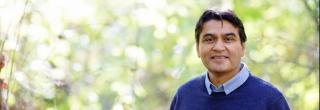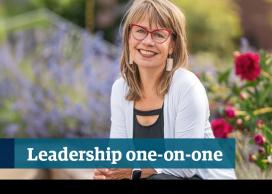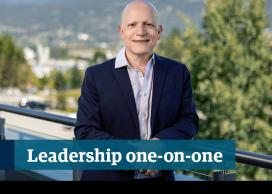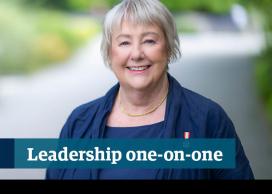Dr. Rehan Sadiq is Provost and Vice-President, Academic, at UBC Okanagan. He was appointed to this role in August 2022.
In addition to his role as Provost and Vice-President, Academic, Dr. Sadiq is a professor of Civil Engineering and a Distinguished University Scholar. He is also a co-lead of the Life Cycle Management Laboratory in the School of Engineering in the Okanagan. Previously, he served as the Executive Associate Dean of the School of Engineering and Co-director of the Digital Learning Factory Initiative at UBC Okanagan.
Dr. Sadiq’s research focuses on the areas of asset management of water supply systems, environmental risk analysis and lifecycle assessment of the built environment.
Outside of work, he enjoys going on road trips with his family, reading a broad range of books, and taking long walks or hikes whenever he gets a chance.
Q1. What quality do you most admire in a leader?
RS: I truly admire leaders who believe in courage, honesty and integrity, and have the ability to build trust and collegial relationships with their stakeholders through their unwavering commitment to their work. Earning people’s trust and respect is such an important aspect of achieving goals successfully, so it is crucial for leaders to be able to trust people and gain their trust in return.
I also appreciate a good sense of humour in leaders and their ability to find humour in their everyday routine.
Q2. What makes you laugh?
RS: So many things make me laugh. I often laugh when I reminisce over my own journey and remember things I did many years ago – all of which were a part of my learning, but are funny nonetheless.
I also find the human mind fascinating and amusing, especially when I see how fake news influences our lives these days.
Q3. Who inspires you, and why?
RS: I find inspiration in the innate qualities of people, especially those who demonstrate thoughtfulness, depth, compassion, kindness and wisdom in their actions. These attributes play such an instrumental role in establishing strong and lasting relationships with people. I’m inspired by people who are passionate and deliver beyond the requirements of their role.
Q4. For you, what makes UBC different?
RS: In my 14 years at UBC, I’ve seen the university evolve tremendously. In my roles as a researcher, professor, and academic and administrative leader, I feel lucky to have partnered with some of the brightest minds in the world.
What really sets UBC apart is the quality of its people. I strongly believe that it is the great people at UBC who make it a world-class institution. We are blessed with talented students, faculty and staff joining us from diverse backgrounds, and I’m always amazed by their ability to produce quality work and innovative ideas that will take us forward.
Q5. What’s the most important lesson you’ve learned, in your career to date?
RS: My biggest lesson in my years of experience is that what you hear are opinions and what you see is a perspective. Facts and realities presented are not always the truth, so being able to weigh all information and perspectives in order to make sound decisions is a crucial leadership skill. It is only human to get carried away with emotion, but making good decisions that benefit everyone requires compassion with wisdom.
Q6. How do you like to recharge?
RS: Walking (and sometimes running) invigorates me! I absolutely love walking and never miss an opportunity to go for long walks and hikes – in fact, I’ve even gone on many hikes with colleagues in my research lab. I think I’ve walked on every single trail in Kelowna. I also enjoy the outdoors and love to go on road trips with my family.
I’m also an avid reader and am particularly interested in non-fiction books covering a wide range of subjects, such as social science, history, philosophy and psychology. I’m very curious to understand how the human mind has developed, especially against the backdrop of history and the impact of globalization over centuries. Reading allows me to understand myself better. Some of my recent reads are The Great Transformation by Karen Armstrong, Rumi’s Secret by Brad Gooch, and My Name is Red by Ohran Pamuk.
Q7. What is the best advice you were ever given?
RS: Don’t make decisions when you are very angry or very happy. I’ve also learned that in life, you need to be willing to give something to get something; so if you want to be respected, you need to give respect first. I try my best to apply these principles in my life.
Q8. What do you value in your colleagues?
RS: Of all the things I value in my colleagues, I appreciate a strong work ethic the most. As part of the university’s leadership, people depend on us for the decisions we make and how we deliver on them. I hold myself and those around me to a high standard and value determination, commitment and a strong focus on quality work and excellence. I also value individuals who make fair and transparent decisions and treat everyone equitably.
Q9. What do you hope will be your lasting impact at UBC?
RS: Beyond my title and work at the university, I would like to be remembered for how I treated people. If I can be remembered as someone who treated my students and colleagues with kindness, fairness and respect, that would be the biggest compliment.
Q10. If you could have a super power, what would it be?
RS: I don’t believe in super powers – I like to be human, with my vulnerabilities and strengths.
But if I must choose one, I think I’d love to have a good balance between intellect and intuition as a super power. Wouldn’t it be great to fully understand other people’s perspectives to strengthen decision-making and see the world from their eyes?
Q11. What is your vision for UBC Okanagan’s academic future in the coming years?
RS: I’ve seen UBC Okanagan evolve so much since I joined in late 2008. My generation of professors are the trailblazers of this campus and it has been a privilege to see the extraordinary growth over the years – from the quality and diversity of our student, faculty and staff community, to the infrastructure and expansion of our courses. UBC Okanagan is a melting pot of ideas with an optimistic vision for the future – we are always looking ahead by 10, 20 and even 30 years and beyond.
I am proud of our commitment to the values we uphold. We have such a strong focus on equity, diversity and inclusion, and indigenization – and we have demonstrated our commitment by being partners at a societal level. Not only do we have ideas, but we also implement them.
I want to see UBC Okanagan renowned for its academic excellence, not only in Canada but also globally, attracting and retaining the best students and offering top-quality undergraduate and graduate programs. I also want to see more experiential learning opportunities for students, as this will have a positive impact on the professional lives of our students and the community at large.
Q12. Higher education is always evolving, now more than ever. What can UBC do to ensure the students of today are equipped for the workplace of tomorrow?
RS: The skills that our students learn at UBC will carry them forward, so to ensure they are ready for life after university – to make a difference – we need to keep up with changing times. Over the last three years, the pandemic has taught us so much and it is critical to learn from those lessons as we prepare for the future. Something as simple as being able to communicate via Zoom, which wasn’t common a few years ago, has made it so easy to stay connected. Now, I want to see how we can continue to take advantage of the tools available to us to build stronger connections.
Being prepared for the future requires us to be nimble and flexible in our teaching approaches. My dream is to attract the best students from all over the world to UBC, where we have a shared vision of not only advancing our research endeavours but also giving back to the community at large. For instance, I would love to see how UBC can play a role as an academic partner in addressing global issues that span beyond cutting-edge research. Can you imagine being able to give diverse students the educational experience of supporting the needs of farmers in a remote village in any part of the world? Technology has made this possible, and I think this really is the role of a public institution – to make a global impact, be a part of something big and address the grand challenges the world is facing in rapidly changing times.
Published: February 27, 2023
Interviewed by: Aditi Ghosh-Mooruth, UBC Internal Communications



